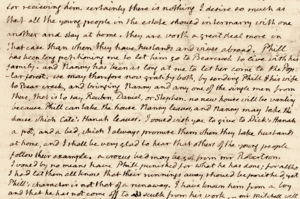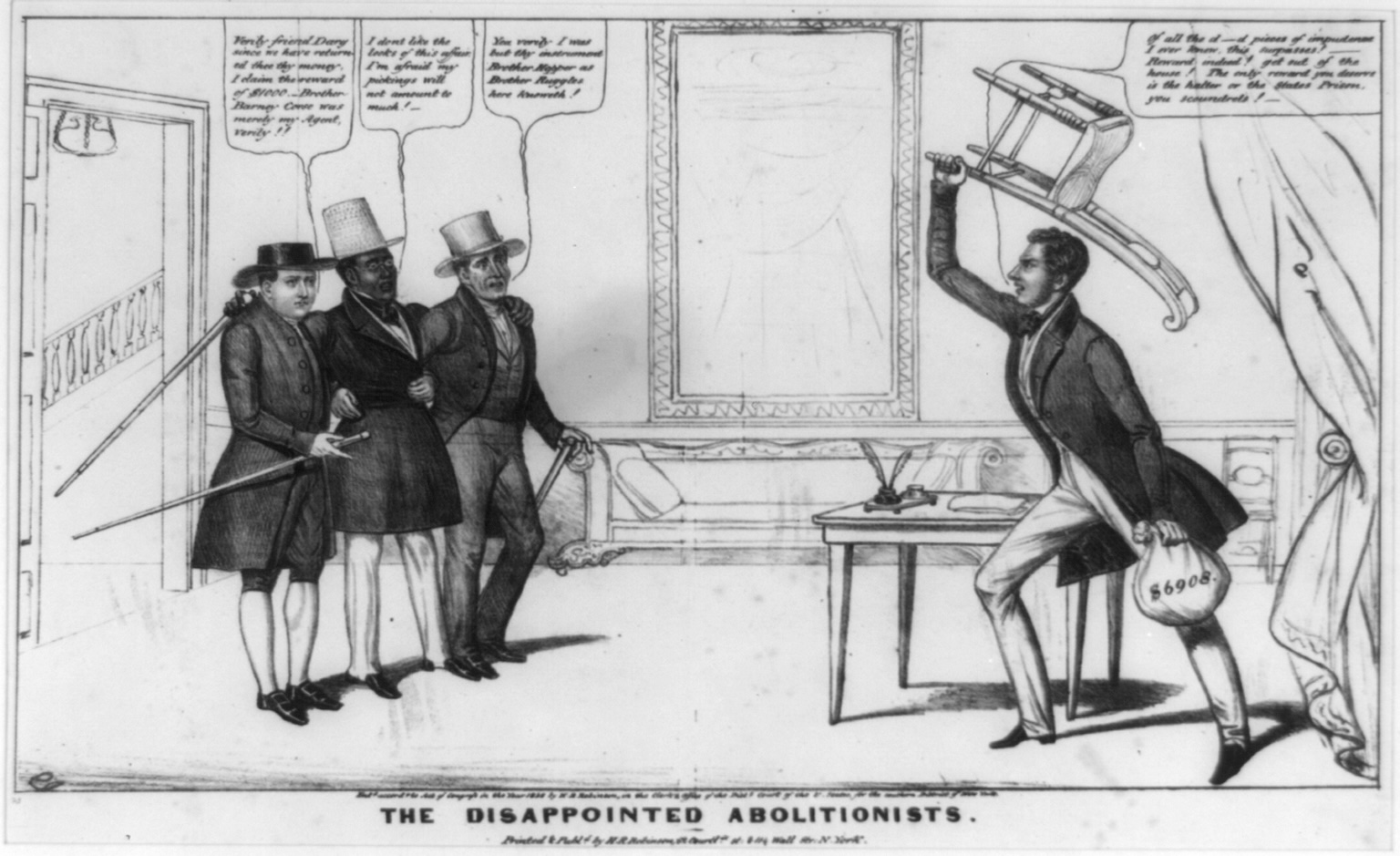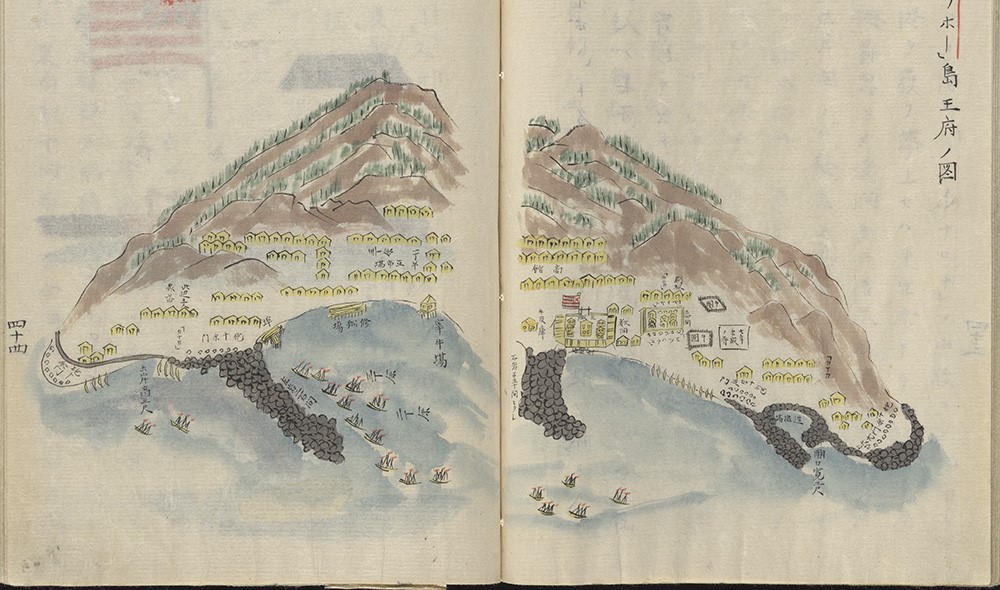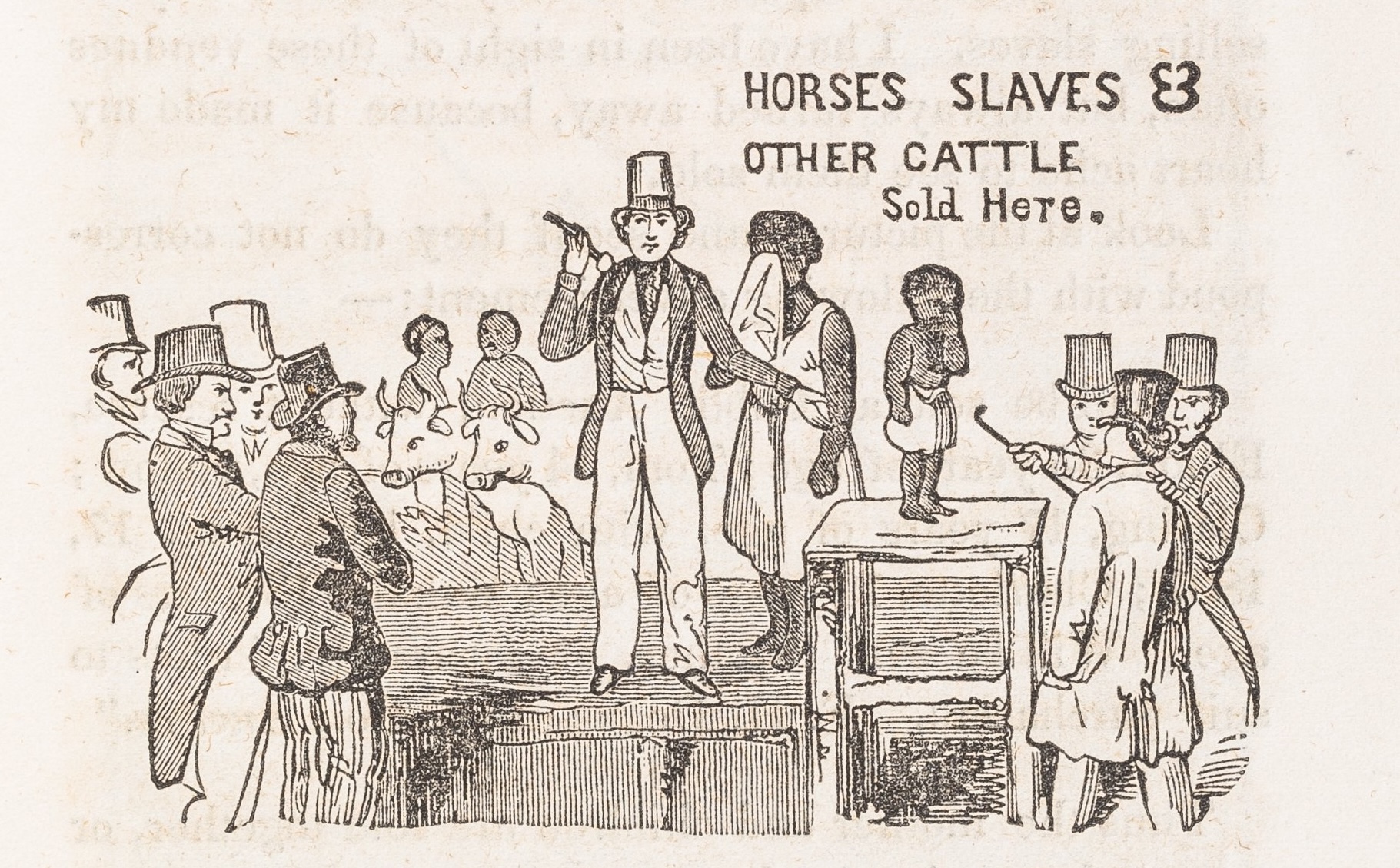Part I
Is interest in the racism of past and hallowed philosophers and statesmen the obsession of a politically correct society gone amok? Or is it an acknowledgement of the ways in which the racist ideas of our forebears still hold sway over our present social and political concerns? Does the racism of a thinker like Thomas Jefferson irremediably infect his writings and his legacy? Must it stalk him, creeping from century to century?
These sorts of questions rage around Jefferson. Clearly the third president means a great deal to many Americans. Since his death in 1826–and even before it–the “American Sphinx” has been invoked in countless contexts and to countless purposes. And Jefferson’s slaveholding and his attitudes towards race have been debated on-and-off for nearly two hundred years. But no aspect of Jefferson’s life has been more hotly contested than his relationship with Sally Hemings, his house slave and purported mistress as well as his wife’s illegitimate half sister. As historian Winthrop Jordan has put it, “What is historically important about the Hemings-Jefferson affair is that it has seemed to many Americans to have mattered.”
Yet it’s not at all clear what Thomas Jefferson’s political legacy, his racist writings, his slaveholding, his proclamations against slavery, his fear of miscegenation, and his (apparently) active miscegenation mean to us when taken together. Why do we care about this, particularly the purported relationship with Hemings, and what is it precisely we are caring about?
Jefferson presented his racial views in a number of contexts, most famously in the Notes on the State of Virginia, first published in 1787. In this work Jefferson argued against the French naturalist Buffon’s claims that America was a nation stilted by a brutal climate and thus materially incapable of greatness. Its animals were feeble and stunted in comparison to the hardy European breeds, and its native peoples hairless, enervated, and barely capable of reproducing themselves. Jefferson argued quite movingly for the nobility of Native Americans to bolster his case against Buffon as to the climactic splendor and present and future greatness of America. But as part of this argument he also argued for the deep inferiority of African Americans.

Here’s how Jefferson closed his chapter on “Laws”: “I advance it therefore as a suspicion only, that the blacks, whether originally a distinct race, or made distinct by time and circumstances, are inferior to the whites in the endowments of both body and mind. It is not against experience to suppose, that different species of the same genus, or varieties of the same species, may possess different qualifications. Will not a lover of natural history then, one who views the gradations in all the races of animals with the eye of philosophy, excuse an effort to keep those in the department of man as distinct as nature has formed them? This unfortunate difference of color, and perhaps of faculty, is a powerful obstacle to the emancipation of these people.”
This argument for the separation of the races based on the natural inferiority of blacks derived from Jefferson’s “observations” of the childlike simplicity of blacks, their wild imaginations, their incapacity to reason and create serious art, their “disagreeable odour.” Jefferson also emphasized that blacks exhibited a uniform aesthetic preference for the “flowing hair” and “elegant symmetry of form” of whites, a preference as uniform as “the preference of the Oran-ootan for the black women over those of his own species.”
Despite this scientifically cloaked bigotry, Jefferson’s views about the inferiority of Africans and African Americans were not unique, and taken alone they are not what makes Jefferson’s racism of perennial interest. Two things seem to rub us differently about Jefferson’s racist statements and those of other statesmen and philosophers. First, they conflict with some of the most eloquent words ever penned about democracy and the rights of man, like these on toleration: “It is error alone which needs the support of government. Truth can stand by itself. Subject opinion to coercion: whom will you make your inquisitors? Fallible men: men governed by bad passions.”
Or these remarks on the consequences of this coercion: “The shackles, therefore, which shall not be knocked off at the conclusion of this war, will remain on us long, will be made heavier and heavier, till our rights shall revive or expire in a convulsion.”
Here Jefferson invokes the metaphors of bondage, slavery, and slave revolt in a powerful plea for toleration. But it is not just the conflicts between bigotry and eloquence that make Jefferson a perennial object of interest. It is also something quite different–sex–and the ways in which Jefferson’s much disputed personal life mirrors American feelings about race. Whether one views Jefferson as a man of great character impugned by politically correct wags or as an active miscegenator keeping a hidden family of slave children and never admitting it, these different perspectives both respond to the sexual and racial miasma of plantation life. Was the life of the gentleman farmer a life of Cincinnatean virtue or of Neronian debauchery? And what to say of the great patriarch who was a Virginia planter and the mysterious relationship with Sally Hemings, which can be viewed as benevolent master and servant, as rapist and victim, or as lovers.
Part II
One might hope for a resolution to such a bundle of conflicts and perspectives, but it doesn’t appear forthcoming. From O.J. to death-row defenses, DNA analysis has functioned recently in American culture as a scientific meeting ground for race, sex, sin, and death. But in Jefferson’s case, DNA has failed to resolve much at all, establishing only that one of Sally Hemings’s children was fathered by Jefferson or his brother.

These “findings” have done little to end the bitter disputes like the current scandal over who can be buried in the Jefferson family burial ground. Just this April the Thomas Jefferson Heritage Society published a group of scholarly essays attempting to establish Randolph Jefferson as the father of Sally Hemings’s child, Eston. But other scholars counter that these essays fail to respond to some of the basic objections to the paternity of Sally Hemings’s children by anyone other than Thomas Jefferson, like the abundant statistical evidence totally independent of genetic evidence. Clearly genetics makes a poor court in such a complicated issue. If anything, it stifles more insightful discussion.
While electronic discussions continue on homepages and bulletin boards across the Web, the most sophisticated discussions of the Jefferson-Hemings affair are still to be found in print. Recently, Annette Gordon-Reed added a new “Author’s Note” concerning the DNA findings to her almost immediately classic Thomas Jefferson and Sally Hemings: An American Controversy (Charlottesville, 1997; Paperback reprint with Author’s Note, Charlottesville, 1998). With impressive rigor and precision Gordon-Reed demonstrated that a number of eminent historians’ considerations of the relationship between Thomas Jefferson and Sally Hemings were distorted by hero worship, partisan jockeying, and pervasive if tacit assumptions about white supremacy.
The end result was what Gordon-Reed called “The Corrosive Nature of the Enterprise of Defense.” Gordon-Reed’s investigation revealed how obvious answers to nagging questions about Jefferson and Hemings were cast aside because historians assumed that black informants–particularly Madison Hemings and Jefferson’s other alleged descendants–had less access to the truth than whites. Furthermore, historians had ignored reams of additional evidence which were collected as far back as 1974 in Fawn M. Brodie’s Thomas Jefferson: An Intimate History (New York, 1974). There were quite legitimate reasons for historians to reject Fawn Brodie’s psychoanalytic approach, but Brodie’s precious baby of documentary evidence was thrown out with the psychoanalytic bathwater. Instead of weighing the evidence reasonably, historians offered defenses for Jefferson of the circular He – couldn’t – have – done – that! – Why? – Because – his – character – was – such – that – he – didn’t – do – such – things! – Why? – Because – he – didn’t – do – such – things – so – he – couldn’t – have – done – that! variety. (Which is not to say that only defenses are corrupt. Conor Cruise O’Brien’s The Long Affair: Thomas Jefferson and the French Revolution 1785-1800 [Chicago, 1996] seems nearly as corrupted in its prosecution, placing the Hemings-Jefferson affair and Jefferson’s enthusiasms for the French Revolution in salacious parallel.)
Gordon-Reed’s book received excellent reviews and was quickly–perhaps too quickly–judged decisive. This positive reception unsettled the author, as she remarks in her new preface: “What I hope is not lost in all the focus on DNA is the original message of the book: the treatment of Jefferson and Hemings reveals the contingent nature of blacks’ participation in shaping the accepted verities of American life . . . very few reviewers grappled with the role that the doctrine of white supremacy played in all of this. The preferred response was to focus on the carelessness of the historians discussed in the book, bypassing the central question about the source of that carelessness” (xiii).
Gordon-Reed fears her book will be treated as a detective story, the DNA test the smoking gun, and “The Corrosive Nature of the Enterprise of Defense” as merely a set of clues. Although her historical arguments for the Hemings-Jefferson affair are in many ways more convincing than the DNA tests, the purpose of the book was something more (and more important) than settling the Jefferson/Hemings question for good. Gordon-Reed notes that the complexities of the eighteenth and ninenteenth-century records, how they were read through (sometimes tacit, sometimes explicit) white supremacist assumptions, and the importance of understanding the historical record itself, threaten to be silenced by the public perception of DNA as the final truth of paternity and thus somehow, magically, explanatory of race.
But our attitudes about the whole affair, our recognition of certain claims as legitimate and others as unfounded are as much part of the corrosive nature of defense as the contortions of the historians. One of Gordon-Reed’s most controversial examples is our very desire to treat the relationship between Jefferson and Hemings as rape or coercive act when, given the long-term nature of the relationship, it likely may have been something entirely different, even a loving relationship. Gordon-Reed opens her pivotal chapter on “Thomas Jefferson” by describing a mock trial of Thomas Jefferson, put on by the New York Bar, with Charles Ogletree as prosecutor, Drew Days as defense attorney, and William Rehnquist as trial judge. “The issue to be decided by the trial was whether examples of hypocrisy in Jefferson’s life significantly diminished his contributions to American Society.” Although the judge, and the majority of the audience (including Gordon-Reed and her husband), voted to acquit and forgive, forgiveness says little about the historical record, or its meaning. The question rather is, What is the legacy of guilt and hypocrisy?
Part III
Fortunately a recent collection of essays does a surprisingly good job at drawing out many of these issues and questioning them, if not offering ultimate solutions. Sally Hemings and Thomas Jefferson: History, Memory, and Civic Culture (Charlottesville, 1999) is a set of papers given at a conference in March 1999 in the wake of the DNA testing and Annette Gordon-Reed’s book. All of the essays in the collection say something fruitful about the problem of discussing a figure like Jefferson, his legacy, and race in America. And they provide a range of perspectives, from putting the Jefferson-Hemings affair in historical context to considering its meaning in terms of Jefferson’s legacy, the practice of history, cultural memory, and the weight of the present.

A particularly noteworthy example is “Bonds of Memory: Identity and the Hemings Family” by Lucia Stanton and Dianne Swann-Wright, both of whom work at the Thomas Jefferson Memorial Foundation in Monticello. “Bonds of Memory” interweaves the authors’ very different autobiographical experiences as black and white Americans with a narrative about the fate of the Hemings family on either side of the color barrier and an affirmation of the legitimacy of oral history. Stanton and Swann-Wright pull off an almost impossible task in producing an essay that is profound, historically precise, not at all self-indulgent, and signals the inseparability of our contemporary experience of race from our historical apprehension of it.
In effect, Stanton and Swann-Wright illustrate that how Jefferson looks to us is not determined entirely by the man himself. Our response to Jefferson varies according to the impact his hypocrisies and declarations have had on our lives. I would perhaps view them differently if I were white, or black, passing successfully (like some of Sally Hemings’s children), barely passing (like some others living in fear of being unmasked as blacks), newly discovering I was passing (like some of those who discovered they were descendants of Sally Hemings’s unions with a Jefferson, whether Thomas or Randolph, and were deeply confused by their identities), or someone who doesn’t fall so neatly into the bipolar disorder of contemporary American race.
This range of autobiographically influenced responses to Jefferson is well illustrated by the fact that, although there was apparently considerable agreement at the March 1999 conference about Jefferson, “considerable controversy was generated by the question: Within the social and cultural contexts of their day, what sort of relationship could Hemings and Jefferson have had?” Gordon-Reed had argued that we have little basis to claim that there was no love in the relationship and we should be careful in how we describe it given the lack of evidence. There is a popular cultural tradition, in Barbara Chase-Riboud’s Sally Hemings (New York, 1979) and most recently in the CBS miniseries Sally Hemings: An American Scandal, which represents the relationship as a kind of antebellum West Side Story. Gordon-Reed argued that the persistence of this tradition–and the way it rankles intellectuals– means it should not be so quickly dismissed. (Dumas Malone, Jefferson’s most famous biographer whom Gordon-Reed showed to be one of Jefferson’s most corrupt defenders, even campaigned against the airing of Chase-Riboud’s book as a made-for-TV-movie.)
Why is the idea that Jefferson might have loved Hemings so dangerous? The likely answer is sex and race–and more particularly miscegenation. Clarence Walker opens his “Denial is not a River in Egypt” by describing his college students’ great discomfort whenever the issue of miscegenation arises. This kind of discomfort is part of what makes the issue so loaded. And defenses of Jefferson as a man incapable of an “illicit” affair with a slave sometimes seem to mask a Jeffersonian horror at the fact that blacks and whites were often not as “distinct” as whites might have pretended.
That DNA evidence hasn’t resolved the question of Jefferson’s relationship with Hemings is, perhaps, fitting, since it’s not even clear what the question is. What was Jefferson guilty of: Rape? Love? Hypocrisy? Being a typical member of the Virginia planter class? Being an atypical bundle of contradictions?
What then to say about the consequences of the Jefferson-Heming’s affair for Jefferson’s meaning for democracy and liberalism? Jack Rakove takes this topic on circuitously in his not entirely successful essay, “Our Jefferson.” Rakove attempts to assess what is valuable in Jefferson’s legacy and to examine to whom that legacy belongs. But in doing so he lapses into apologia: that Jefferson’s Notes on Virginia should not be read too harshly, that Jefferson himself was conflicted in racial matters, and that “Jefferson was born into a world that was only beginning to understand that slavery was an evil of a kind radically different from the other wrongs of life.”
In forging “Our” Jefferson, Rakove argues that owning Jefferson as a forebear is far more than an affirmation of the joys of democracy and the wages of hypocrisy and moral responsibility. As another ruminative essay, Gordon Wood’s “The Ghosts of Monticello,” shows quite successfully, the difficulties of dealing with a symbolic figure like Jefferson are always changing, as the present places different pulls on their legacy. Although the last few years’ debate about Jefferson hasn’t solved any problems or come to many agreements, it offers an opportunity to look at a man about whom we know a great deal (although perhaps not as much as we’d like) and a woman about whom we know hardly anything. The mysteriousness of their relationship for their progeny on both sides of the color line and for those of us who are attempting to understand it is made more apparent, which is perhaps all one ought to ask for. While Jefferson’s white family decides who can be buried in the family graveyard, it is likely that absolute standards will be asked for in areas where there are few. Meanwhile, we might remember that, although we know much about cradle and grave (and perhaps less about cradle than we might like), it is what was in between that is far more interesting.
This article originally appeared in issue 1.4 (July, 2001).
Aaron Garrett is assistant professor of philosophy at Boston University and author of the chapter on “Human Nature” in the forthcoming Cambridge History of Eighteenth-Century Philosophy




















